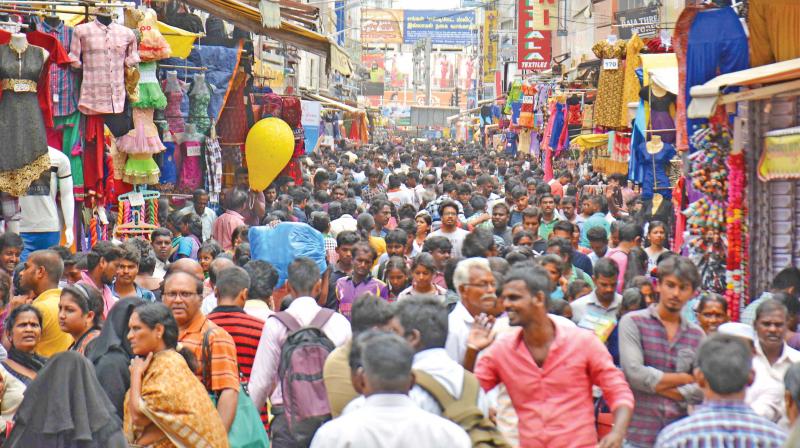Post-GST: Weekend shoppers tighten purse strings

Chennai/Coimbatore: The weekend was dampened for Chennaiites as the capital city was completely under the siege of Goods and Services Tax (GST), which came into force on Saturday.
Public visiting supermarkets and restaurants came out with huge bills as CGST and SGST were added to each and every item. Restaurant bills and revised menu cards with increased rates also went viral with social media. When DC visited commercial hubs like T Nagar, Purasawalkam and Parry’s, bustling shopping hubs, jewellery shops and eateries were deserted confirming the decrease in footfall.
Restaurants and eateries
With the tax levied on air-conditioned restaurants having escalated to 18 percent, non-AC restaurants to 12 per cent and petty eateries with an annual income of Rs 20 to Rs 75 lakh to 5 per cent, the footfall was considerably low on Saturday, rued hoteliers.
“On a weekend, usually 150-200 people have breakfast here. On Saturday only 92 people had tiffin and almost all of them complained about the rise in prices. Idly, which is the cheapest item in the menu now costs Rs 42 as opposed to the previous amount of Rs 35,” said branch manager of A2B - T Nagar.
Most of the petty hotels that do not issue bills in the city were shut down. With 5 per cent GST imposed on the eateries, hoteliers are also working on a change in the menu card.
Departmental stores and supermarkets
With different slabs for pulses, jam, butter and other goods, the bill raised in supermarkets was more elaborate to help the public understand the new tax system. “Initially, a customer would put some unwanted items or excess goods in his cart. But the customer’s purchase behaviour was different due to GST. Most of them have limited the items and this will affect our daily revenue,” said V. Praveen, VS Mart, a supermarket in Nungambakkam.
However, the provision stores, that deliver provisions without bills functioned normally. “GST is a major blow to us and we do not know the repercussions,” said Mohammed Khan, a shopkeeper at Nanganallur.
Jewellery shops and shopping malls
Jewellery shops that worked past midnight on Friday remained deserted on Saturday with minimal shoppers. “Under GST, jewellery attracts 3 per cent tax from the previous slab of 2.5 per cent and this makes a difference in the final bill.
As anticipated the footfall in all the showrooms including our branch reduced on the first day of GST implementation”, opined a branch manager with GRT Jewellers in South Chennai.
Shopping malls also lacked the weekend josh despite the pre-GST and post GST offers. There were stores working through manual billings as computers were not configured with the new tax system.
Website crashes
On the day one of the implementation of Goods and Service tax, the traders in the city experienced problems in downloading the excel template from the websites. As there is a heavy traffic due to mounting number of traders getting registered for GST, the GST Network (GSTN) and GST websites had crashed.
Federation of Tamil Nadu Traders’ AssociationPresident A.M. Vikrama Raja told Deccan Chronicle, “Many of us could not download the excel template as the website was either very slow or non functional. We are using manual bills.”
Those registered for GST are required to download Excel template from the websites to upload sales data on to the GST portal. Over 65 lakh traders have registered for GST so far across the country and there is still a backlog of nearly 20 lakh.
Textile Industries not so happy
M. Senthilkumar, Chairman, The Southern India Mills’ Association (SIMA) has said the implementation of GST, all indirect taxes would be merged. Tamil Nadu accounts for 1/3rd of the nation’s textile business and that state governments, especially the TN government should come forward and remove certain taxes and levies that are not subsumed in GST like Market Committee Fee and various other municipal taxes.
SIMA Chairman, however, is disappointed for not considering the genuine demand of reducing 18% GST on (man-made fibres) MMF and blended spun yarn to 12% which will avoid huge inverted duty accumulation at grey fabric stage.
“The decision of considering any rate revision only after three months would seriously affect the synthetic spinning and grey fabric manufacturing sectors.
The GST Council had presumed that the total duty levied on MMF and its blended spun yarn was 17.5% with 12.5% Central excise and 5% VAT which is true only for filament yarn. In the case MMF spun yarn over 97% sales was inter-State with 2% CST and almost all the yarn sale was at zero rate optional route with regard to central excise.”
He has stated that the inverted duty would steeply increase the fabric price and make Indian textile uncompetitive as the imports would loom large with a reduction of duty on imports, to the tune of 12%.

